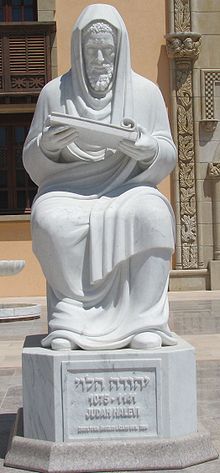Judah Halevi
Although he occupied an honored position as a physician, intellectual, and communal leader, Halevi was stirred to attempt a perilous journey to spend his final days in the Land of Israel.His deep passion for Israel eventually overpowered his hesitation and concerns about leaving his friends, family and status to live under difficult Crusader rule.Additionally, the uncertainties of Jewish communal status and favor within the government during the period of the Reconquista may have caused him to consider the future security of Jews in the Diaspora.[13] Raymond P. Scheindlin notes that "the legend of his martyrdom, combined with the prominence of the Land of Israel in his life and works, invested his image with a mystique that had an important afterlife in Zionist literature."[4] Documents that remain from Halevi's last years are panegyric to his various hosts in Egypt and explorations of his religious motivations for his aliyah, preserved in the Cairo geniza.Some contain imaginary details of the voyage, such as descriptions of a turbulent sea that express trepidation for the journey but hope for the spiritual light that might follow.Poems and letters bearing on Halevi's journey are translated and explicated in Raymond P. Scheindlin, The Song of the Distant Dove (Oxford University Press, 2007).[4][5] Bródy's edition divides ha-Levi's work as follows: Judah's secular or non-religious poetry is composed of poems of friendship, love, humor, and eulogy.In Egypt, where the muse of his youth found a glorious "Indian summer" in the circle of his friends, he wrote his "swan-song":[25] "Wondrous is this land to see, With perfume its meadows laden, But more fair than all to me Is yon slender, gentle maiden.They follow established themes in Arabic and Hebrew poetry such as the yearning of the lover contrasted with the cruelty of the beloved, who possesses a shining countenance."[28] Halevi's attachment to the Jewish people is a significant theme in his religious poetry; he identifies his sufferings and hopes with that of the broader group.Sun and moon, these minister for aye; The laws of day and night cease nevermore: Given for signs to Jacob's seed that they Shall ever be a nation — till these be o'er.He used devices like sound patterns and vivid imagery to evoke the suffering of exile and fear of the destruction of his people as a result of a delayed redemption.One ends with the words: "On Friday doth my cup o'erflow / What blissful rest the night shall know / When, in thine arms, my toil and woe / Are all forgot, Sabbath my love!'Tis dusk, with sudden light, distilled / From one sweet face, the world is filled; / The tumult of my heart is stilled / For thou art come, Sabbath my love![6] In the Kuzari, he confronts Aristotelian philosophy, Christianity and Islam and expounds his views upon the teachings of Judaism, speaking in favor of accessing God through tradition and devotion rather than philosophical speculation.The work was originally written in Arabic, and entitled Kitab al-Ḥujjah wal-Dalil fi Nuṣr al-Din al-Dhalil, كتاب الحجة و الدليل في نصرة الدين الذليل,.
ToledoTudelaAl-AndalusJerusalemKingdom of JerusalemMedieval philosophyPoetryJewish philosophyReligious philosophyKuzariHebrewromanizedArabicSephardic JewishphilosopherCrusaderAlexandriaFatimid EgyptAlmoravid ruleAlfonso VIAlfonso the BattlerGranadaMoses Ibn EzraTanakh"Golden Age of Jewish culture"CaesareaLand of IsraelGod of IsraelaliyahReconquistaapostatepanegyricCairo genizamuwaššaḥinternal rhymemonorhymestrophicmuwaššaḥātkharjasRomancedīwānHaim (Henrik) BródyDrinking songsLevi al-TabbanZaragozaAbraham ibn EzraCórdobaAaron ben Jeshua AlamaniqasidaIsaac AlfasiLucena, CordobaepithalamiaHebrew riddlesPsalmsZionideskinnotTisha B'AvLibi baMizrachnational poetScripturepiyyutimselichotKaraitespiyyutSamuel di CastelnuovoShabbatSalernoTalmudicwitticismHeinrich BrodyProvencalJacob ben Chayyim Comprat Vidal FarissolHellenisticHasmoneanSadduceanPhariseeBoethusianAristobulus of AlexandriaPhilo of AlexandriaMedievalBrethren of PurityIbn Bajjah (Avempace)Ismaili philosophyJewish KalamKabbalahRabbinic JudaismHasdai ibn ShaprutIbn GabirolAbraham bar HiyyaBahya ibn PaqudaAbraham ibn DaudJoseph ibn TzaddikMaimonidesNachmanidesSamuel ibn TibbonJoseph ben JudahShem-Tov ibn FalaqueraGersonidesMoses of NarbonneIsaac ben SheshetHasdai CrescasJoseph AlboElia del MedigoJudah MinzIsaac AbarbanelJudah Leon AbravanelNatan'el al-FayyumiMansur ibn Sulayman al-GhamariIsaac IsraeliSaadia Gaonal-MukkamasHibat Allah Abu'l-BarakatIbn KammunaKabbalistKaraismTosafistModernOrthodoxSephardicChabadChassidicConservativeReformExistentialistReconstructionistHolocaust